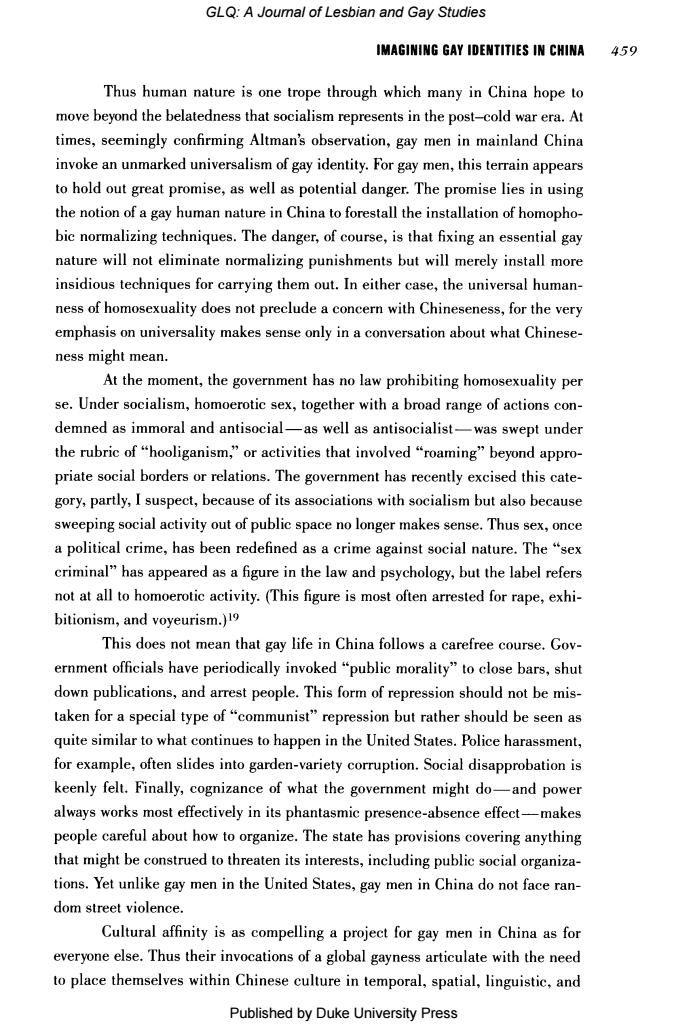正在加载图片...

GLQ:A Joumal of Lesbian and Gay Studies IMAGINING GAY IDENTITIES IN CHINA 459 Thus human nature is one trope through which many in China hope to move beyond the belatedness that socialism represents in the post-cold war era.At times,seemingly confirming Altman's observation,gay men in mainland China invoke an unmarked universalism of gay identity.For gay men,this terrain appears to hold out great promise,as well as potential danger.The promise lies in using the notion of a gay human nature in China to forestall the installation of homopho- bic normalizing techniques.The danger,of course,is that fixing an essential gay nature will not eliminate normalizing punishments but will merely install more insidious techniques for carrying them out.In either case,the universal human- ness of homosexuality does not preclude a concern with Chineseness,for the very emphasis on universality makes sense only in a conversation about what Chinese- ness might mean. At the moment,the government has no law prohibiting homosexuality per se.Under socialism,homoerotic sex,together with a broad range of actions con- demned as immoral and antisocial-as well as antisocialist-was swept under the rubric of“hooliganism,”or activities that involved“roaming”beyond appro- priate social borders or relations.The government has recently excised this cate- gory,partly,I suspect,because of its associations with socialism but also because sweeping social activity out of public space no longer makes sense.Thus sex,once a political crime,has been redefined as a crime against social nature.The "sex criminal"has appeared as a figure in the law and psychology,but the label refers not at all to homoerotic activity.(This figure is most often arrested for rape,exhi- bitionism,and voyeurism.)19 This does not mean that gay life in China follows a carefree course.Gov- ernment officials have periodically invoked "public morality"to close bars,shut down publications,and arrest people.This form of repression should not be mis- taken for a special type of "communist"repression but rather should be seen as quite similar to what continues to happen in the United States.Police harassment, for example,often slides into garden-variety corruption.Social disapprobation is keenly felt.Finally,cognizance of what the government might do-and power always works most effectively in its phantasmic presence-absence effect-makes people careful about how to organize.The state has provisions covering anything that might be construed to threaten its interests,including public social organiza- tions.Yet unlike gay men in the United States,gay men in China do not face ran- dom street violence. Cultural affinity is as compelling a project for gay men in China as for everyone else.Thus their invocations of a global gayness articulate with the need to place themselves within Chinese culture in temporal,spatial,linguistic,and Published by Duke University PressIMAGINING GAY IDENTITIES IN CHINA 459 Thus human nature is one trope through which many in China hope to move beyond the belatedness that socialism represents in the post-cold war era. At times, seemingly confirming Altman’s observation, gay men in mainland China invoke an unmarked universalism of gay identity. For gay men, this terrain appears to hold out great promise, as well as potential danger. The promise lies in using the notion of a gay human nature in China to forestall the installation of homophobic normalizing techniques. The danger, of course, is that fixing an essential gay nature will not eliminate normalizing punishments but will merely install more insidious techniques for carrying them out. In either case, the universal humanness of homosexuality does not preclude a concern with Chineseness, for the very emphasis on universality makes sense only in a conversation about what Chineseness might mean. At the moment, the government has no law prohibiting homosexuality per se. Under socialism, homoerotic sex, together with a broad range of actions condemned as immoral and antisocial-as well as antisocialist-was swept under the rubric of “hooliganism,” or activities that involved “roaming” beyond appropriate social borders or relations. The government has recently excised this category, partly, I suspect, because of its associations with socialism but also because sweeping social activity out of public space no longer makes sense. Thus sex, once a political crime, has been redefined as a crime against social nature. The “sex criminal” has appeared as a figure in the law and psychology, but the label refers not at all to homoerotic activity. (This figure is most often arrested for rape, exhibitionism, and voyeurism.)l9 This does not mean that gay life in China follows a carefree course. Government officials have periodically invoked “public morality” to close bars, shut down publications, and arrest people. This form of repression should not be mistaken for a special type of “communist” repression but rather should be seen as quite similar to what continues to happen in the United States. Police harassment, for example, often slides into garden-variety corruption. Social disapprobation is keenly felt. Finally, cognizance of what the government might do-and power always works most effectively in its phantasmic presence-absence effect -makes people careful about how to organize. The state has provisions covering anything that might be construed to threaten its interests, including public social organizations. Yet unlike gay men in the United States, gay men in China do not face random street violence. Cultural affinity is as compelling a project for gay men in China as for everyone else. Thus their invocations of a global gayness articulate with the need to place themselves within Chinese culture in temporal, spatial, linguistic, and GLQ: A Journal of Lesbian and Gay Studies Published by Duke University Press